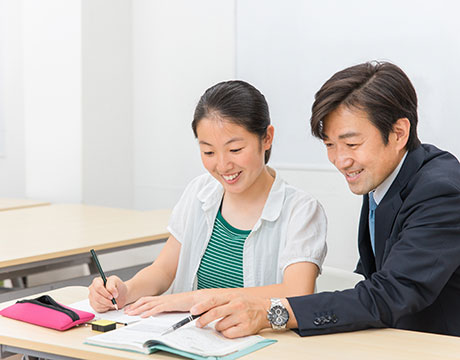Our company is engaged in education-related business centered on Japanese language learning.
From long-term study abroad courses to Japanese courses for everyday use and business situations, we offer a variety of courses to suit your goals.
1 VIP-style Japanese Instruction
1) For Businessmen
- Basic Japanese
- Guidance on Writing Business Documents
- Japanese Language Instruction for Business Negotiations
2) For Higher Education
- Basic Japanese
- Academic Descriptive Guidance
- Interview Measures
3) For Living in Japan
- Basic Japanese
- Japanese Language Instruction for Raising Children
- Japanese Instruction for the Workplace
* We will propose the most suitable curriculum according to the needs and academic abilities of each student.

2 Online Japanese conversation
- Subscription flat-rate system
* We will propose the most suitable curriculum according to the needs and academic abilities of each student.
3 Japanese language training for foreign employees
1) Dispatch of instructors
- Business Japanese training
- Service Japanese training
- Japanese style business etiquette training
- Cross-cultural communication training
2) Online Japanese conversation course

4 A bridge to famous universities between Japan and China
- Strong backup for Chinese students studying at Japanese universities
- Carefully support Japanese international students in entering Chinese universities and graduate schools
Yuanzhi Education and Wollongong Joint Research Institute of Central China Normal University cooperate in recruiting students in Japan to recruit university graduates majoring in computer technology (science) and communication engineering to study in China. As we all know, Central China Normal University is a well-known 211 normal university in China and all courses in this program are taught in English. During the duration of their studies, students can go to the University of Wollongong, a well-known university in Australia, for half a year or more, and there are many scholarships for them to apply for. After graduation, they can apply for a master’s degree from China Normal University and Wollongong University! - We can also arrange study abroad programs at famous Japanese universities.

5 VIP-style academic guidance
1) Entering high school
2) Going on to college
3) Advancing to graduate school
At our company, there are many graduates from difficult universities and prestigious universities such as the University of Tokyo, Waseda University, Keio University, and Hitotsubashi University. We will give you detailed instructions.

Strengths of Yuanzhi Education
- Professional instructors from China and Japan with a high level of specialized knowledge will explain Japanese manners and culture in an easy-to-understand manner, and provide Japanese language instruction that matches the situation.
- Acquire correct vocalization and pronunciation, an attractive voice, and a persuasive way of speaking.
- You can learn useful vocabulary and expressions in real life with our original teaching materials.
- We offer the most suitable curriculum according to each student’s learning needs.
- By giving appropriate feedback to learners’ concerns and issues, we will teach innovative learning methods that improve motivation and enthusiasm.
日本語勉強に関する認識
Continuity is the most important thing in learning Japanese and the only way to sustain learning is to have fun and study independently. There is a famous saying in China “interest is the best teacher”. We believe that the best way to enjoy learning Japanese and make use of it in your daily life is to have an experienced Japanese teacher instruct you.
Japanese language proficiency includes the four skills of [listening, speaking, reading, and writing]. [Listening and reading] is an input that can be improved through daily extensive listening and extensive reading. [Speaking/writing] is an output, and it is a little more difficult than [listening/reading]. This is why the vast majority of people in China who graduated from Japanese language departments have passed JLPT N1 but cannot communicate with Japanese people verbally or in writing.
I majored in Japanese in September 2005, started teaching Japanese in July 2008, and came to Japan in September 2011. The recommended way to study Japanese is to simultaneously progress [listening, speaking, reading, and writing]. Not only will you get twice as much work with half the effort, but you’ll never forget what you’ve learned. Specific skills in [listening, speaking, reading, and writing] can be improved further by intensive practice according to the learner’s needs.
[Listening] includes “intensive listening” and “extensive listening”, both of which are indispensable practice methods. While “extensive listening” can cultivate a sense of language, “intensive listening” can acquire vocabulary and grammar.
[Reading comprehension] includes “extensive reading” and “intensive reading”. “Extensive reading” not only absorbs a lot of information but also allows you to input words and grammar intentionally or unconsciously. In addition, you can analyze each word, grammar, and related content by “scrubbing”.
[Writing] shows the words, grammar, and sentence patterns you have learned in the form of sentences and articles and becomes output.
[Speaking] is a little more difficult than [writing], and requires the ability to [write] + [on the spot]. [Speaking] is the most difficult thing for foreigners, so if you want to improve your conversational skills, you need to put in the extra effort.
The traditional way of learning Japanese for exams is: memorizing words, memorizing grammar, practicing around the content of the exam, and occasionally watching Japanese dramas or anime. A reasonable learning method is to take into account [listening, speaking, reading, and writing], especially [speaking] while [listening], which can prevent the appearance of [dumb Japanese]. [Writing] It doesn’t have to be a composition or a diary, you can express your thoughts on SNS or communicate with friends (Japanese, etc.) in writing. [Speaking] It can be to follow the Japanese in the recording or video or to communicate with the Japanese in person or online. [Listening and reading] (input) reaches a certain level, it will form its own sense of language. [Writing] Be able to standardize your wording and terminology, as it is difficult to connect the upper and lower parts. [Speaking] needs to organize the language on the basis of understanding the content of the other party. For adults, it is similar to [writing] and belongs to the comprehensive skill in Japanese learning, but it is more difficult than [writing].
Many people mistakenly believe that the frequency of using Chinese characters is directly proportional to the level of Japanese proficiency, but this is not the case. [Chinese Vocabulary] and [Japanese Vocabulary] with the same meaning (mostly hiragana vocabulary), [Chinese Vocabulary] tends to be used in written language (the language sense is blunt), and daily spoken language tends to use [Japanese Vocabulary] (the language sense is soft). Regarding foreign words, not all foreign words, that is, katakana words, come from English. In fact, there are words from small languages such as French, German, and Portuguese.
The study of Japanese includes not only the study of language but also the cognition of Japanese culture. Because language and culture are whole, this also includes an understanding of the Japanese way of thinking. The so-called words and deeds reflect these aspects. The Japanese are
[be polite and humble]
[Do not disturb others]
[Keep the rules]
[Keep pace with everyone]
[Maintain a clean environment]
[Equally, cherish external beauty and inner beauty]
[Always say thank you]
[When dating people, an appropriate sense of distance is necessary] etc.
These concepts have penetrated into the bones of the Japanese. The understanding and application of these common senses will help everyone communicate with the Japanese unimpeded. deal with. This is especially true if you live in Japan!
